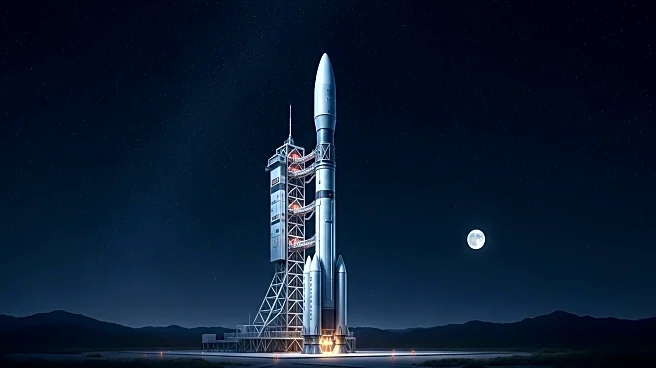What's Happening?
Russia's state space agency, Roscosmos, is preparing for the test launch of its Soyuz-5 rocket in December. The Soyuz-5, a medium-class launch vehicle, is expected to become fully operational by 2028. It is equipped with RD-171MV engines and aims to carry a 17-ton payload. The launch is significant for Roscosmos, which has faced funding shortages since Russia's invasion of Ukraine. The agency has lost substantial revenue and is selling non-core assets to support its activities. The Soyuz-5 will be launched from Kazakhstan's Baikonur Cosmodrome, as Roscosmos seeks to maintain its space operations amid geopolitical tensions.
Why It's Important?
The Soyuz-5 launch represents a critical step for Russia's space sector, which has been impacted by international sanctions and severed partnerships, notably with the European Space Agency. The successful launch could bolster Russia's position in the global space race, as countries like China and the U.S. continue to advance their space exploration capabilities. The development of the Soyuz-5 and future projects like the Soyuz-7 could enhance Russia's technological innovation and economic prospects, despite challenges posed by geopolitical conflicts and funding constraints.
What's Next?
Roscosmos plans to continue developing the Soyuz-7, a reusable methane-fueled rocket, expected to be finalized by 2030. The agency's focus on cost-effective and reusable technology aligns with global trends in space exploration. The success of the Soyuz-5 launch could attract foreign investment and partnerships, particularly from Kazakhstan, which is leveraging Baikonur to develop its own space industry. The geopolitical landscape may influence future collaborations and the strategic direction of Russia's space initiatives.
Beyond the Headlines
The Soyuz-5 launch highlights the broader implications of geopolitical tensions on scientific and technological advancements. Russia's space sector faces challenges in maintaining international cooperation and funding, which could impact its long-term innovation and competitiveness. The focus on reusable technology reflects a shift towards sustainable space exploration, with potential benefits for environmental and economic stakeholders. The development of new rocket models may also influence cultural narratives around space exploration and technological progress.








